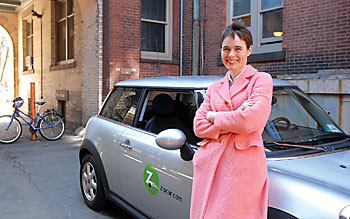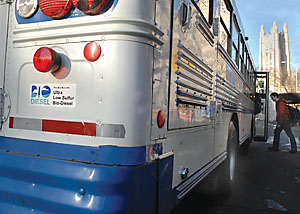YALE’S GROWING ‘GREEN’ INITIATIVES |
| SPECIAL SUPPLEMENT
SPECIAL SUPPLEMENT |
| APRIL 2008
APRIL 2008
 | Holly Parker, director of sustainable transportation systems, is shown here with one of Yale's Zipcars. Over 500 campus community members have already signed up for the car-sharing program. |
Adding zip to Yale’s sustainable transportation options
Holly Parker doesn’t own a car, so she is well accustomed to getting
around using her bicycle or public transit, and occasionally renting one of
the University’s new Zipcars.
Being car-less, she says, helps her to be more effective in her job as Yale’s
first director of sustainable transportation systems. Her chief goal is to
help reduce the University’s carbon footprint by encouraging alternative
forms of travel to and around campus.
“I try out everything I encourage others to try: shuttle buses, Connecticut
Transit buses, commuter trains and bicycling,” says Parker, who joined
the University in the spring of 2007 after serving as manager of Harvard University’s
Commuter Choice Program.
She especially hopes to reduce the number of employees who commute to and from
campus alone in their cars. That mission is driven both by environmental concerns — reducing
air pollution and greenhouse gases — and practical and economic considerations.
“As the University has expanded, parking space on the campus has become
increasingly limited,” notes Parker. “Real estate is too valuable
to use the very limited available space as parking lots, and the cost of constructing
underground parking is upwards of $100,000 per space. So it simply makes sense
to explore options for reducing the number of vehicles coming to campus.”
Parker acknowledges that changing the habits of those who are accustomed to
driving in alone is a challenge. But she believes wholeheartedly that faculty
and staff members will consider other modes of transportation if they are user-friendly
and if employees’ needs and preferences can be met.
“We’re not going to take away from people the ability to park on
campus, but we’re going to give them options that are better,” says
Parker. “I think we’re going to slowly get to a place where the convenience
and the cost-effectiveness of the options we promote for sustainable transportation — combined
with the inconvenience of traffic congestion and the fact that parking over time
will be less and less proximate to people’s workplaces — make those
options the most attractive choices.”
Parker has already conducted a transportation survey of Yale’s approximately
20,000 employees and graduate students to find out how they commute and to
learn what transportation options they find most appealing. She is currently
exploring such issues as the infrastructure for bicycling to and around the
University and improving the service of Yale’s own shuttle buses, and
she is working with the City of New Haven and others on such matters as enhancing
pedestrian and bicyclists’ safety. She is also examining various new
incentives for employees to encourage more environmentally friendly modes of
transportation.
New Haven, she says, has the advantage of being a small-sized city that is
relatively easy to navigate on foot or by bicycle. In fact, notes Parker, Prevention
magazine recently rated it 19th on its list of the nation’s “Best
Walking Cities.”
But when walking to one’s destination is not possible, Parker hopes that
Yale staff members and students will choose options that are the least harmful
to the environment. “We have some really good stuff in place so far,
and we’re getting better,” says Parker of the University’s
alternative transportation initiatives.
A summary of some of the transportation-related options, resources and incentives
currently available to Yale community members are:
Zipcar
Zipcar, the nation’s largest car-sharing program, was introduced on the
campus in the fall of 2007. Zipcar has partnered with Yale to make nine fuel-efficient
cars — including several Toyota Prius hybrids — available 24 hours
a day, seven days a week at five campus locations. All faculty, staff and students
over age 18 (over 21 for those with a valid foreign driver’s license)
are eligible to join the Zipcar service. Membership costs $35 per year; the
membership cost may be applied to rental costs during the first month after
joining. Members receive Zipcards in the mail, and use these cards to make
reservations online and to enter the car. The rental fee is $8.50 an hour and
$65 a day.
“We already have over 500 members,” says Parker. “Zipcar is
a concept that has been functioning well in Boston, New York and Washington,
D.C. I’m its biggest fan. The reservation system is incredibly easy and
streamlined, and it’s a great way for students to get around and for employees
who come to campus using mass transportation to travel once they have arrived
on campus.”
 | All of the University's shuttle buses are powered on ultra-low sulfur diesel fuel combined with 20% biodiesel fuel and use a particulate-trap technology that makes them even more earth-friendly.
|
Shuttle buses using biodiesel fuel
All of the shuttle buses that transport Yale affiliates around the campus and
to its surrounding neighborhoods are powered on ultra-low sulfur diesel fuel
combined with 20% biodiesel fuel. The shuttles are free for anyone with a valid
Yale I.D., and all are equipped with bike racks and with GPS tracking devices,
so bus travelers can find out the location of buses in real time on the Department
of Parking and Transit website (www.yale.edu/shuttle). The buses travel in
10- to 20-minute intervals.
According to Parker, all of the Yale shuttles utilize a particulate-trap technology,
making them even safer for the environment. Older buses are slowly being replaced.
Carpooling and public transportation benefits
To encourage carpooling to and from campus, the University offers parking permit
fee discounts to those who use this method of transportation (60% off the regular
fee for two-person carpools and a 75% discount for three- or more person carpools).
Individuals who carpool, vanpool or use public transportation also receive
three one-day permits to park in Yale lots on days when they need to drive
to campus.
The Office of Parking and Transit offers links on its website to GoLoco and
NuRide, two online services that match individuals interested in carpooling
or in sharing rides.
Guaranteed Ride Home Program
All Yale employees registered for carpools or vanpools are eligible for the
University’s emergency ride home (or to a doctor’s office or hospital)
benefit. The Parking and Transit Office (203-432-9790) provides reimbursement
for a free ride from a local taxi company. Shore Line East riders receive the
same benefit through Rideworks (800-ALL-RIDE or www.shorelineeast.com/guarride.htm).
Qualified Transportation Benefit Plan
This plan allows employees to pay for mass transit, including vanpool expenses,
or for non-Yale parking with pre-tax dollars through payroll deduction. As
per federal guidelines, employees designate a portion of their pre-tax income
to pay for work-related transportation and parking expenses (up to $115 per
month for mass transit/vanpool expenses and up to $220 per month for parking
in non-Yale lots). Funds may be set aside for either or both of these programs.
Application forms are available at www.yale.edu/parkingandtransit.
Yale Departmental Bike Program
The University plans to purchase 10 bicycles for use by 10 individual departments
in this new pilot program funded by the Office of Sustainability. “The
goal is to encourage Yale staff members who would not otherwise consider cycling
to destinations on campus to do so,” says Parker. The bicycles are equipped
with fenders, a covered chain, a rack/pannier system to carry items, a combination
U-lock and a universal-sized helmet. Parker and her staff will work with each
department to ensure proper bike maintenance and provide training, if necessary,
among other procedures.
“Once people start seeing a bike with a department’s name on it in
reflective lettering, I think they’ll encourage their own departments to
sign up as well,” says Parker. The program may be expanded if it is deemed
successful, she adds.
Further information on sustainable
transportation initiatives is available at www.yale.edu/parkingandtransit or
by contacting Parker at holly.parker@yale.edu.
-
Introduction
Leading by action to promote a better future
New energy programs helping Yale to achieve its goal of
reducing greenhouse emissions 43% by 2020
Newest campus buildings have many earth-friendly features
Office works to make sustainability ‘everyone’s business’
In dining halls and classrooms, project raising awareness about relationship between ‘people, land and food’
Recycling ensures University’s trash is not going to waste
Regulated waste gets special treatment at OEHS
Eli Exchange
Adding zip to Yale’s sustainable transportation options
F&ES dean is an advocate for environmental action on and off campus
Yale experts tackling wide range of environmental issues
Scores of educational programs are devoted to ecological topics
‘Eco-friendly’ Yale merchandise
-
Yale Bulletin & Calendar
|

 YALE’S GROWING ‘GREEN’ INITIATIVES
YALE’S GROWING ‘GREEN’ INITIATIVES |
| SPECIAL SUPPLEMENT
SPECIAL SUPPLEMENT |
| APRIL 2008
APRIL 2008

